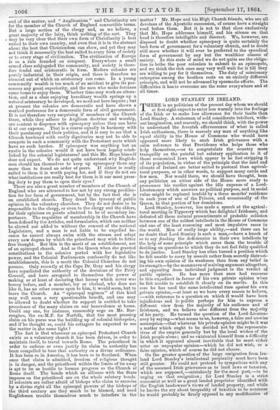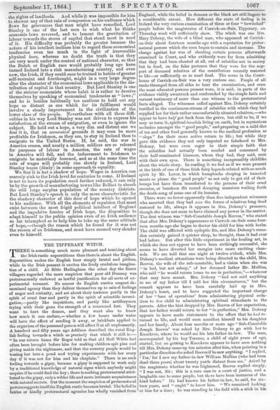LORD STANLEY IN IRELAND.
THERE is no politician of the present day whom we should at first sight expect to enter less warmly into the feelings of the Irish or to make less allowance for their faults than Lord Stanley. A statesman of cold considerate intellect, with- out imagination, and scarcely, we should think, with the power to understand the feverish effervescence of what is called Irish enthusiasm, there is scarcely any man of anything like equal ability in the House of Commons who would have appeared more likely to snub Irish grievances with a
calm reference to that Providence who helps those who hslp themselves,—or to congratulate the country more tranquilly on the painful but salutary application to it of those economical laws which appear to be fast stripping it of its population, in virtue of the principle that the land and climate of Ireland are better suited to pastoral than agricul- tural purposes, or in other words, to support many cattle and few men. Nor would there, we should have thought, been any politician on either side of the House more ready to pronounce his verdict against the idle expense of a Lord- Lieutenancy which answers no political purpose, and in social value might be replaced tenfold by a three months' residence in each year of one of the Princes, and occasionally of the Queen, in that portion of her dominions.
Lord Stanley, however, has made a speech at the agricul- tural meeting in Tipperary which has delighted Irishmen,' and defeated all these natural presentiments of probable collision between one of the coldest intellects in the House of Commons and one of the least reasoning and most impulsive races in the world. Men of really large ability,—and there can be no doubt that Lord Stanley is such a man,—have a knack of so to say flanking the deficiencies in their own intellects by the help of some principle which saves them the trouble of deciding on questions to which they do not feel fully qualified to do justice. Lord Stanley has often turned a position which he felt unable to carry by assault rather from secretly distrust- ing his own opinion of its weakness than from any belief in its strength—by the manoeuvre of waiving argument altogether, and appealing from individual judgment to the verdict of public opinion. He has more than once had recourse to this expedient in favour of his own private opinion when he felt unable to establish it clearly on its merits. In this case he has used the same intellectual ruse against his own private opinion,—at least so we have every reason to believe, —with reference to a question on which it would have been injudicious and in politic perhaps for him to express a different view from the majority of his audience and of Irishmen, and we believe also different from the majority of his party. He turned the question of the Lord-Lieuten- ancy by saying—what seems to us, however, a false and unwise assumption—that whatever his private opinion might be it was a matter which ought to be decided not by the representa- tives of the empire generally but by the local wishes of the Irish people alone; and so extricated himself from a difficulty in which it appeared almost inevitable that he must either
utter an unpopular opinion—which he did not wish, or a false opinion, which of course he did not choose.
On the greater question of the large emigration from Ire- land Lord Stanley's intellectual perplexity must have been still greater. He could not pretend to sympathize with any of the assumed Irish grievances as to land laws or taxation, which are supposed,—mistakenly for the most part,—to be urging on that emigration; for Lord Stanley is a strict
economist as well as a great landed proprietor identified with the English landowner's views of landed property, and while he knows the cry about inequality of taxation to be nonsense he would probably be firmly opposed to any modification of • the rights of landlords. And while it was impossible for him to shower any of that rain of compassion on his audience which flows for grievances that man might have remedied, Lord Stanley is one of the last men to wish what he thinks economic laws reversed, and to lament the gravitation of labour towards the stores of capital that stand most in need of it. His difficulty was probably the greater because the nature of his intellect inclines him to regard these economical tendencies even too much in the light of irreversible physical laws, whereas no doubt the truth is that they are very much under the control of national character, so that the Dutch or English race would probably long ago have turned Ireland into a rich manufacturing country, and even now, the Irish, if they could once be trained to habits of greater self-restraint and forethought, might in a very large degree alter the character of the economical laws applicable to the dis- tribution of capital in that country. But Lord Stanley is one of the stricter economists whose habit it is rather to deceive themselves by speaking of economical tendencies as " laws ;" and he is besides habitually too cautious to hold out any hope so distant as one which for its fulfilment would involve a steady improvement in the civilization of the lower class of the people. Nevertheless with all these diffi- culties in his way Lord Stanley was not driven to express his satisfaction at the stream of emigration, or even to ignore the subject. He held out a hope, a very dim and distant one we fear it is, that on economical grounds it may soon be more profitable for Irishmen, as they are, to stay in Ireland than to emigrate to the United States. If, he said, the war in America ceases, and nearly a million soldiers are so released for purposes of labour in America, the rate of wages in America will fall, and the inducement to Irishmen to emigrate be materially lessened, and as at the same time the rate of wages will probably rise slowly in Ireland, Lord Stanley hopes (dimly) in some approach to equality. We fear it is but a shadow of hope. Wages in America can scarcely sink to the Irish level for centuries to come. If Ireland is not to have its population much further reduced, it can only be by the growth of manufacturing towns like Belfast to absorb the still large surplus population of the country districts. But Lord Stanley's speech is only the more characteristic for the shadowy character of this door of hope which he opened to his audience. With all the elements of repulsion that must exist between the most frigid political intellect of England and the impulsive fancies of Irish hope, the disposition to adapt himself to the public opinion even of an Irish audience so far triumphed as to help him to take up the same attitude of hope,—though the reason which he found for it was not the reason of an Irishman, and must have seemed very slender even to himself.































 Previous page
Previous page